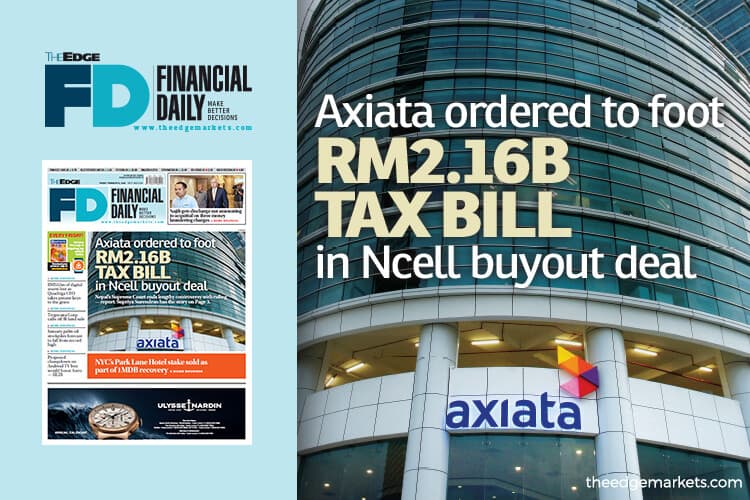
This article first appeared in The Edge Financial Daily on February 8, 2019
KUALA LUMPUR: Ncell Private Ltd and its major shareholder, Axiata Group Bhd, have been ordered to pay a capital gains tax of 61 billion Nepalese rupees (RM2.16 billion), excluding late fees and fines, for the Ncell buyout deal, according to Nepalese media reports.
The order, issued by the grand full bench of Nepal’s Supreme Court on Wednesday, puts an end to the years-long controversy over who should foot the tax bill following the sale of Ncell by Sweden-based Telia Sonera to Axiata, The Himalayan Times reported.
Large Taxpayers Office (LTPO) of Nepal chief Dhani Ram Sharma was quoted as saying the apex court order paved the way for the tax authority to collect the outstanding capital gains tax from Ncell and Axiata.
“Once we get the copy of the verdict, we’ll initiate the collecting of the tax by writing letters to Ncell and Axiata,” Sharma said.
The Ncell buyout deal was subject to a capital gains tax of about 61 billion rupees. “But the two companies may have to pay around 66 billion rupees in taxes if late fees are factored in,” Sharma told The Himalayan Times.
According to the daily, Ncell had paid tax instalments totalling 21 billion rupees. “Despite this, we’ll ask the telecommunications giant to deposit the entire 66 billion rupees. We’ll deduct 21 billion rupees only after Ncell and Axiata file a formal application demanding a reduction in the tax bill,” Sharma said.
The Kathmandu Post reported that the issue centred on whether the buying company should take the tax liability of the seller after TeliaSonera, which previously owned Ncell, exited Nepal without paying the capital gains tax after selling its 80% stake to Axiata.
Kishore Poudel, a media specialist at the apex court, told the Kathmandu Post that the court issued the order in the names of Ncell and Axiata, saying they are liable to pay the capital gains tax as the mobile company was under effective control of Axiata.
In December 2015, Axiata’s wholly-owned subsidiary, Axiata Investments (UK) Ltd, entered into a conditional sale and purchase agreement with TeliaSonera UTA Holdings BV and SEA Telecom Investments BV for the acquisition of the entire issued capital of Reynolds Holdings Ltd, which in turn held an 80% stake in Ncell, for US$1.37 billion. TeliaSonera owned 75.45% of Reynolds, and SEA Telecom the remaining 24.55%.
The acquisition, completed in April 2016, marked Axiata’s entry into the Nepalese market via the acquisition of Ncell, one of the country’s top mobile operators.
Axiata’s response
In response to The Edge Financial Daily’s queries, Axiata said “none of the Axiata parties to the litigation has received the judgement and order of the Supreme Court following its ruling, nor does the group have any details of what was ordered by the court”.
Axiata said the court’s decision is in response to two writ petitions by NCell and Reynolds, and two public interest litigations (PILs) brought against various parties concerning the capital gains tax claim after completing the sale.
“The Supreme Court, in its ruling on Feb 6, 2019 dismissed both the writ petitions by Reynolds and Ncell, and one of the PILs. However, Axiata understands that the court has ruled in favour of the PIL filed by Dwarikanath Dhungel and others broadly pleading that the onus of capital gains tax is on Ncell, Reynolds and Axiata UK,” it said.
Axiata added that Ncell, Reynolds and Axiata UK were given the full clearance by the LTPO of its obligations to withhold any capital gains tax payment on behalf of the seller Telia concerning the transaction via a letter from LTPO in June 2017.
“This is following the full and final payment made by Ncell, albeit under protest on the basis that capital gains tax is not applicable for offshore transactions and even if it’s applicable, any shortfall in payment is the seller’s responsibility,” said Axiata.
Axiata, 37% owned by Khazanah Nasional Bhd, saw its shares falling 12 sen or 2.98% to RM3.90 yesterday, with a market capitalisation of RM35.4 billion. Trading volume was heavy at 8.85 million shares, surpassing the stock’s 200-day average trading volume of 4.86 million shares.